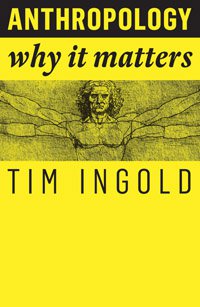
The print version of this article can be downloaded as a PDF file.
Tim Ingold is Professor of Social Anthropology, University of Aberdeen. He was elected a Fellow of the British Academy in 1997.
Anthropology: Why It Matters is one of a new series of short books explaining the importance of different academic disciplines. Who is the book written for?
It is a book for the coming generation. The future of human life will be in their hands, and anthropology, I argue, is a speculative and comparative inquiry into life’s conditions and possibilities. The idea behind the book series as a whole is actually twofold. On the one hand, it is to demonstrate – for each and every field of the humanities – why it is not just a luxury but an indispensable companion in forging a world fit for future generations. On the other hand, it is to address young students, those to whom we will pass the torch of learning, to help them in their choice of vocation and encourage them in their endeavours. Combining both objectives within the space of a short text was a challenge. Anthropology is not a discipline for the faint-hearted, and I was determined not to hide or to smooth over its complexities. But at the same time the text had to be accessible to readers unfamiliar with its concepts and preoccupations. The book is not an introduction to the subject, in the sense of an overture to all its different fields and subfields. It is more in the nature of a manifesto, a call to arms, and an invitation to readers to join with us in the spirit of ongoing inquiry.
The book provides a clear account of how anthropology has developed as a discipline, and you bring this alive by revealing how you yourself, from an undergraduate onwards, reacted to the succession of theories and approaches that have competed with each other. How important was it to give the reader an idea of your own journey?
Anthropology, as I present it, is not a continent of knowledge, with defined borders, to be mapped out and explored. It is rather a conversation, a gathering of many voices – both of scholars and of the people among whom they study – each of which has different experiences to share and different things to say. Of these, my own voice is but one. I can only tell my own story; it is for others to tell theirs. That’s why I acknowledge at the outset that what I present is a personal account, and that others, with their ears to the ground in other times and places, would undoubtedly tell it differently. That multiplicity is part of the richness of the discipline, and key to its vitality.
You argue that, to overcome one of the rifts of anthropology, we need to confront ‘the twin spectres of culture and race’, and that this will require ‘a revolution in the human sciences’. Can you elaborate?
My concern is that while racial science or ‘raciology’ has been comprehensively discredited, the principles that underpinned it have not, and that they are still at work, behind the scenes, in much ostensibly counter-racist thinking about human biological and cultural variation. I refer to two principles in particular: inheritance and essentialism. The first holds that traits or characteristics that define the potentials of a life are passed on at the point of conception, independently in advance of that life, thus effectively short-circuiting the processes of ontogenetic development within which human capacities and dispositions actually take shape. The second remains embedded in appeals to universal human nature, to the idea that underlying all human variation is a baseline of attributes common to all. The fallacy of essentialism is to suppose that elements of a character specification, which can only be arrived at through a process of abstraction and generalisation, are concretely preinstalled in human bodies and minds.
Race, then, is what you get if you compound inheritance with essentialism. It is still there when scientists speak of so-called modern humans as a subspecies of humankind, Homo sapiens sapiens. Nor will the substitution of ‘culture’ for ‘race’ solve the problem, when it is founded on precisely the same principles. If we think there are distinct cultures, whose essential elements are inherited by non-genetic means, we will continue to reproduce the idea of a distinct nature whose elements are genetically inherited. The only way to truly exorcise the twin spectres of race and culture, I argue, is to think of a world not of multiple and diverse essences but of manifold difference – difference that is not given in advance of every life but continually emergent in the life-course, as it unfolds within the field of its relations with others. Thus cultural differences are biological, in the sense that they arise within processes of development of human organisms within their ever-variable environments. And this, I contend, calls for a way of thinking about history and evolution that completely upends mainstream thinking.
As you spell out your vision for the future of anthropology, a recurring word in your book is ‘conversation’. What different approach does this signify?
Indeed, I have already mentioned the conversation in answer to a previous question. Crucially, it requires us to think of anthropology as a way of studying with people, rather than of making studies of them. This is the key difference of approach. We go to study with people around the world just as we might go to study with great scholars in the university. For anthropology, the world is our university. We listen to what people are telling us: we engage with them, argue with them; perhaps we even disagree with them. But whether we agree with them or not, we have to take them seriously. You cannot have a proper conversation unless you take seriously what the other is saying. But this means listening to what they have to say, not for what it has to say about them. That’s the way we learn. We learn from them, not just about them. This is what it means to undergo an anthropological education.
You say that ‘At no previous time in history … has so much knowledge been married to so little wisdom. It is the task of anthropology … to restore the balance’. What do you mean by that?
First we need to distinguish between wisdom and knowledge. I do rather object to the idea, put about by many of my colleagues, of ‘anthropological knowledge production’. They worry a lot about what this knowledge is, how it is produced, and how anyone might recognise it when they see it. But I don’t think anthropology should be about producing knowledge at all. We don’t go to the world to collect our data, in order that it can be processed into knowledge products like books and articles. We go to learn, to undergo an education. And what we gain thereby is not so much knowledge as wisdom. These are different things. Knowledge aims to fix things within the concepts and categories of thought, to hold them to account. We often speak of arming ourselves with knowledge, using it to shore up our defences so that we can better cope with adversity. It confers power, control and immunity to attack. But the more we take refuge in the citadels of knowledge, the less attention we pay to what is going on around us. To be wise, to the contrary, is to venture out into the world and take the risk of exposure to what is going on there. It is to let others into our presence, to pay attention and to care. That’s what we do in anthropology. I don’t mean that we can do without knowledge. But we need wisdom as well. People around the world, tutored by life, are wise in so many ways. And in our current global predicament, theirs is a wisdom we cannot afford to ignore. We need to learn from them, not to turn them into objects of analysis.
You warn that ‘the world is at a tipping point’, but you are positive in your belief that anthropology can transform lives. What is the vision here?
We have to believe it. What other option do we have? Of course, anthropology alone cannot transform the world, resolve the environmental crisis or eradicate global poverty. Thankfully, it does not offer final solutions to fix the planet, once and for all. Anthropology is not an optimistic discipline, secure in the belief that it is heralding a better future. We no longer think of it, as our predecessors did, as part of that great movement of thought and manners that would raise humanity from the darkness of ignorance and superstition into the bright light of civilisation. What we do offer, however, is hope. It is the hope that seeks to turn every closure into an opening, every apparent end-point into a new beginning. Hope is the guarantor that life can carry on, of its continuity and sustainability, not just for some at the expense of others, but for everyone. And anthropology is, above all, else, a hopeful discipline.

How are we doing? Your feedback is important to help us shape future issues of the British Academy Review.
To provide reader feedback, please visit www.britishacademy.ac.uk/british-academy-review-feedback